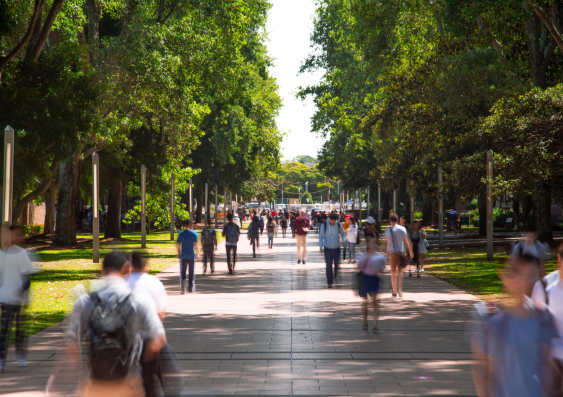UNSW Early Career Researchers Awarded Over $6 Million in Funding
UNSW Sydney has received more than $6 million in the Australian Research Council (ARC) Discovery Early Career Research Awards (DECRA) round for 2024.
The Australian Research Council (ARC) is supporting 200 new early career research projects with more than $86 million in funding for this 2024 round. Fourteen of the 200 projects have been awarded to early career researchers at UNSW.
ARC Chief Executive Officer, Ms Judi Zielke, said that dedicated funding support from the DECRA scheme is a strong investment into the growth of Australia’s research and innovation capacity.
“Increasing Australia’s research and innovation capacity generates new knowledge and results in the development of new technologies, products and ideas, the creation of jobs, economic growth and an enhanced quality of life in Australia,” Ms Zielke said.
UNSW Pro Vice-Chancellor Research, Professor Dane McCamey, said UNSW’s early career academics had a strong result in this year’s highly competitive DECRA funding round.
“I want to congratulate all UNSW early career researchers who have received a 2024 Discovery Early Career Researcher Award. This round of funding reflects the high quality and innovative research of our early career academics across the University. This year we’ve had success across UNSW Science, UNSW Engineering and UNSW Medicine and Health with projects ranging from understanding moral beliefs about interpersonal traumatic experiences to the development of new quantum technologies based on superconductors,” Prof. McCamey said.
“Given the funding rate of less than 20 per cent, a large number of projects with the potential to have significant impact were not funded, and we acknowledge the effort and ideas our early career academics put into those applications.”
Read more: Early career researchers at UNSW awarded $7.6m in funding
Dr Chun-Ho Lin, UNSW Science, has received $461,000 for the project: Lead-free Perovskite Nanowires for Artificial Photo-synapse Arrays. This project aims to develop lead-free nanoscale artificial photo-synapse arrays for energy-efficient and high-speed applications.
Dr Joel Hoffman, UNSW Science, has received $457,378 for the project: Refugee moral injury: Linking interpersonal trauma and social functioning. This research will explore how moral beliefs about past interpersonal traumatic experiences are associated with social outcomes.
Dr Qingfeng Zhai, UNSW Engineering, has received $413,847 for the project: In-situ Imaging and Detecting Electron Transfer for Single Site Reaction. Dr Zhang’s research will guide on developing a high efficiency electrocatalyst to facilitate green energy storage technology and accelerate Australia’s transition into a sustainable economy.
Dr Maja Cassidy, UNSW Science, has received $457,500 for the project: On-chip microwave generation and detection with Josephson photonics. This project will provide economic benefits in developing new sensors for biological, chemical and astronomical processes to advance Australia’s efforts to build a scalable quantum computer.
Dr Belinda Lay, UNSW Science, has received $443,007 for the project: How does the brain process conflicting information? This research uses modern genetic tools in rodents to examine how the brain encodes contradictory information to influence behaviour.
Dr Martin Peeks, UNSW Science, has received $ $451,847 for the project: Pushing the limits of electronic delocalisation in organic molecules. This project aims to uncover the factors which control how molecules delocalise electrons in multiple dimensions.
Dr Dong Wen, UNSW Engineering, has received $435,000 for the project: Towards Processing of Big Streaming Temporal Graphs. The research will develop efficient and scalable algorithms to process big streaming temporal graphs, in demand for cybersecurity, crime monitoring, and e-marketing.
Dr Mareike Dressler, UNSW Science, has received $370,237 for the project: New Frontiers in Large-Scale Polynomial Optimisation. The research aims to develop a mathematical foundation and computational methods for large-scale polynomial optimisation, providing benefit to Australia’s industries and international research standing.
Dr Nathaniel Corrigan, UNSW Engineering, has received $457,647 for the project: Multifunctional polymers for combined algal inactivation and flocculation. This project aims to develop manufacturing processes capable of producing nanostructured polymer and metallic materials, providing cost-effective routes for materials used in energy, health, and water.
Dr Narasinga Rao, UNSW Engineering, has received $402,287 for the project: Multifunctional polymers for combined algal inactivation and flocculation. The aim of the project is to develop multifunctional polymers that can kill and aggregate the cells without causing cell damage, contributing to an increase in sustainability and benefits to the Australian water industry.
Dr Susanne Schweizer, UNSW Science, has received $468,592 for the project: The Impact of Online Social Interactions on Adolescent Cognition. Dr Schweizer’s project aims to investigate whether and how online interactions shape adolescent cognitive development.
Dr Jiaojiao Jiang, UNSW Engineering, has received $432,485 for the project: Modelling the Diffusion of Evolving Rumours in Social Networks. The research explores how to model the complex evolution and diffusion process of evolving rumours in social media.
Dr Ruth Wells, UNSW Medicine & Health, has received $413,847 for the project: Uncovering epistemic injustice in Australian clinical psychology. The project aims to understand how clinical psychologists privilege Western forms of knowing in ways that have the potential to harm people from refugee and culturally and linguistically diverse backgrounds.
Dr Xu Liu, UNSW Engineering, has received $415,727 for the project: Strategies enabling stable perovskite PV devices with efficiency beyond 25 per cent. The outcomes of the research are expected to deliver intellectual property academically and commercially.

